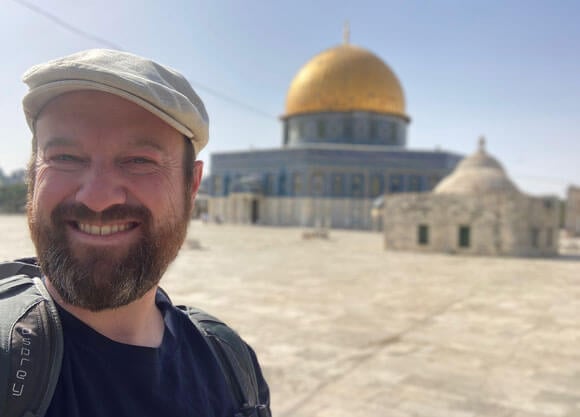
Professor sparks conversation to spread deeper understanding and compassion
November 04, 2022

November 04, 2022

In his first-year seminar course, Father Jordan Lenaghan, Professor Iddrisu Awudu and Rabbi Reena Judd spoke in his class at the same time to discuss how they believe the potential of faith can divide and persecute but could also be crucial for building a just and thriving society, said Rowley.
Father Jordan discussed how belonging to an old and transnational faith community undermined the weaponizing and worshipping of American politics with Awudu, who also mentioned the charity and care for the stranger as central religious commitments, said Rowley.
Rabbi Judd explained how the core principles of the Hebrew Bible emphasize the value of treating others the way they want to be treated. The discussion covered various topics including extremism and forgiveness.
“On day one of my course, I introduced the students to the term ‘religious literacy,’” Rowley said. “Religion plays an important role in politics and foreign affairs and ignorance of this fact is not bliss. Nations that ignore religion are doomed to offend. Much of the world closely links religion with politics, so there are self-interested reasons for world leaders to learn about beliefs other than their own.”
Rowley values the role religion plays in everyday life and hopes his students will understand its impact. He aims to broaden his students’ perspectives with a versatile and compassionate point of view that can be taken anywhere they go.
“We live in a world filled with conflict and polarization, and I do not want to pour gasoline on the fire,” Rowley said. “I don’t expect my students to enter careers that focus on religion and conflict, but I want them to carry a more nuanced view of the topic into whatever path they choose. I want to give them the tools so they can refuse to think the worst about ordinary people who believe differently than them.”
While Rowley was in high school, the September 11, 2001 terrorist attacks happened.
The terrorism sparked his curiosity in understanding how religion and conflict correlate, specifically with Islam.
His studying of Islam branched out to other religions and made him discover how all large and old religious traditions had long histories of violence, he said.
He is now a historian of religion and violence in 17th century England, Scotland, Ireland and colonial America. He also focuses on identity, race, slavery, law and how the past is remembered.
Over the past summer, Rowley wrote a book called “God, Religious Extremism and Violence.” This inspired him to spread awareness of religion and conflict in the classroom.
“Writing the book convinced me there were better and worse ways to think about how religion and conflict intersect,” he said. “I wanted to see if a classroom could discuss controversial topics in ways that promote curiosity, self-criticism, humility, empathy and charity. These are among the cardinal academic virtues, and they are also helpful tools for de-polarization and learning to live with difference.”
Rowley also emphasizes how religion and politics are usually intertwined. He said he looks to spark expressions of belief or unbelief that promote human growth among one another, freedom of conviction and expansive visions of dignity for all.
“Everywhere you poke in history, no matter the region or time, you will find believers and unbelievers who act on their convictions in harmful ways, but that is only part of the story,” Rowley said. “You will also find those who enact their beliefs in humane and inspiring ways. I am interested in telling both stories, but I want to go deeper. I want to understand why some persons use their beliefs to harm and why others in the same community use similar beliefs to heal.”
Quinnipiac Today is your source for what's happening throughout #BobcatNation. Sign up for our weekly email newsletter to be among the first to know about news, events and members of our Bobcat family who are making a positive difference in our world.
Sign Up Now